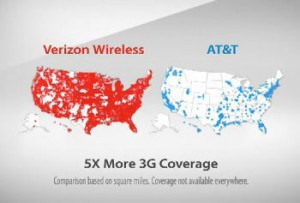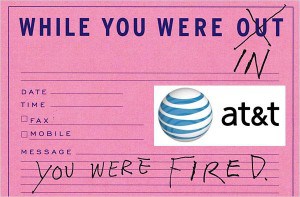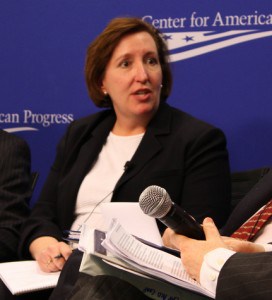
The AT&T Document Dump
On Friday, the tech-wireless media was in a frenzy over news one of AT&T’s law firms accidentally posted an un-censored copy of “highly confidential information” regarding its merger proposal with T-Mobile on the Federal Communications Commission website. Although nobody seems to have a complete copy of the notorious filing to share (it was quickly pulled down after Wireless Week — an industry trade publication — blew the whistle), it turns out if you are willing to plow through AT&T’s periodic publicly-available document dumps, you don’t really need “top secret” information to realize how AT&T is trying to sucker America into accepting its competition-busting merger deal with T-Mobile USA.
What AT&T is Telling the FCC’s Lawyers But Hiding from You
As part of the approval process, the FCC sent AT&T a significant homework assignment, demanding answers to some detailed questions about the justification for the merger, how AT&T intends to use both its existing and newly-acquired wireless spectrum from both Qualcomm and, presumably, T-Mobile, and what specific plans the company has to expand its next generation wireless data network to rural America.
Last week, we learned from the unredacted filing that AT&T will pay $39 billion for T-Mobile to expand a 4G network that AT&T refused to spend $3.8 billion dollars to build themselves. You read that right. AT&T says it can expand its own 4G network to an additional 55 million people for just under $4 billion, or buy T-Mobile for nearly $40 billion to accomplish the same thing.
And what exactly does AT&T get from T-Mobile? A largely urban network running a 4G network that goes nowhere near the 55 million largely rural Americans AT&T claims it intends to serve if the merger wins approval.
So scratch AT&T’s claim that the acquisition of T-Mobile’s network will do anything directly for the rural Americans T-Mobile never directly served.
AT&T’s biggest selling point is that its acquisition of T-Mobile will allow it to reach “97 percent of America” with its improved 4G network:
Because of the spectrum gains and the overall economic benefits resulting from the transaction, senior management made a business judgment that the merger with T-Mobile USA allowed AT&T to expand its LTE build-out to 97 percent of the population. These economic benefits include incremental reductions in cost due to the addition of T-Mobile USA resources, greater scale economies, such as higher volume discounts on handsets and equipment, a larger customer base, and the expectation of a higher take-rate for its LTE service. In addition, the transaction will enable AT&T to re-purpose its existing capital budget allocated to spectrum acquisitions to be allocated for other uses. Overall, the scale and scope of the larger combined wireless business will permit the additional capital investment to be spread over a larger revenue base than would be the case absent the merger.
But the unredacted, “highly confidential” part of the same document exposes important facts AT&T didn’t want the public to know:
“AT&T senior management concluded that, unless AT&T could find a way to expand its LTE footprint on a significantly more cost-effective basis, an LTE deployment to 80 percent of the U.S. population was the most that could be justified,” wrote AT&T counsel Richard Rosen.
 In other words, by collecting T-Mobile customers’ monthly payments, AT&T can utilize that additional revenue, earned mostly from T-Mobile’s urban customer base, and use it to pay for rural cell sites the company itself won’t spend the money to upgrade to achieve that 97 percent coverage.
In other words, by collecting T-Mobile customers’ monthly payments, AT&T can utilize that additional revenue, earned mostly from T-Mobile’s urban customer base, and use it to pay for rural cell sites the company itself won’t spend the money to upgrade to achieve that 97 percent coverage.
You can read between the lines of AT&T’s public statements and come to the same conclusion Rosen made confidentially, but it helps when the company’s own lawyer says it out loud.
Karl Bode from Broadband Reports thinks there is something familiar about that 97 percent figure. It just so happens to be Verizon’s existing 3G coverage area. Verizon pointed to their more robust 3G coverage in a major ad campaign that began just prior to the Christmas shopping season in 2009. It did enough damage to bring AT&T to court in an effort to stop the ads, and reacquainted America with Luke Wilson, who threw postcards on a floor map touting AT&T’s more robust, but considerably less speedy, last-generation EDGE data network.
Verizon completed their expansive 3G network without the benefit of a merger and is in the process of building their 4G LTE network on their own as well — capable of eventually reaching the majority of Americans without taking out the fourth largest wireless carrier in the country. AT&T, on the other hand, spent its time in court and handing Wilson more postcards to throw instead of investing appropriately in its network over the last three years.
AT&T’s Document Dump: More than 1 Million Documents Bury FCC and Justice Lawyers
 Another important revelation that doesn’t require the accidental disclosure of redacted data is the fact AT&T is burying government lawyers at both the FCC and Department of Justice in virtual paper. The company admits to sending at least 1.2 million documents to Justice alone. Reviewing AT&T’s filings with the FCC exposes the use of the old legal trick of burying your opponents in paper, hoping they will miss important documents that could call into question the veracity of the company’s arguments.
Another important revelation that doesn’t require the accidental disclosure of redacted data is the fact AT&T is burying government lawyers at both the FCC and Department of Justice in virtual paper. The company admits to sending at least 1.2 million documents to Justice alone. Reviewing AT&T’s filings with the FCC exposes the use of the old legal trick of burying your opponents in paper, hoping they will miss important documents that could call into question the veracity of the company’s arguments.
With the FCC, AT&T’s lawyers love to use appendices and attachments as virtual dumping grounds, adding copies of virtually any company document that contain “key words” or “search terms” in response to the Commission’s questions.
Take this Q&A exchange:
FCC Question: Provide all plans, analyses, and reports discussing: (a) spectrum requirements for all band segments; (b) the average data transmission speeds that the Company expects customers will be able to obtain; (c) actual and forecasted traffic and busy hour analyses, (d) total data tonnage; (e) capacity utilization rate; (f) vertically integrated operations; or (g) other technical or engineering factors required to attain any available cost savings or other efficiencies necessary to compete profitably in the sale or provision of any relevant product or any relevant service.
AT&T’s Answer: To respond to this request, AT&T conducted key word searches of custodian files as detailed in the tables appended as Exhibit A. Documents responsive to this request are included in AT&T’s production.
It’s the equivalent of putting the phrase “data transmission speeds” into a search engine and then attaching every document that appears in the results and calling it “your answer,” relevant or not.
AT&T used the same approach in answering the FCC’s questions about how the merger would specifically bring improved 4G service to areas without service today, what impact the merger will have on roaming agreements and wholesale access to the combined AT&T/T-Mobile network, and even in response to a basic question about plans for targeting particular competitors, customers, or customer segments after the merger.
Reality: AT&T Doesn’t Care About T-Mobile’s Network
 So what else does AT&T win from a nearly $40 billion investment in T-Mobile? While the leak of confidential information continues to be largely protected by a trade industry publication that has not released it publicly in full, anyone versed in telecommunications can easily find plenty in AT&T’s public documents.
So what else does AT&T win from a nearly $40 billion investment in T-Mobile? While the leak of confidential information continues to be largely protected by a trade industry publication that has not released it publicly in full, anyone versed in telecommunications can easily find plenty in AT&T’s public documents.
The most important point is that AT&T admits, publicly, it has not determined exactly what it intends to do with T-Mobile’s most important asset — its network:
- “AT&T, however, will not be in a position to make any final determinations until it is able to obtain more detailed information about T-Mobile USA’s operations, which will occur later in the acquisition process.”
- “AT&T has not yet begun detailed integration planning efforts.”
Would you spend $40 billion to buy a cellular service provider and not have the first clue what you would do with it?
But it gets even sillier. AT&T doesn’t even know, several months after the merger was announced, exactly where T-Mobile’s cell towers are and what kind of backhaul connectivity they have:
AT&T has not yet begun detailed integration planning and its knowledge of T-Mobile USA’s operations is necessarily limited at this early stage. The actual process of determining which specific T-Mobile USA sites to integrate and which to decommission will require substantially more data from T-Mobile USA regarding its network as well as a more thorough engineering analysis of each area’s characteristics and capacity needs, which could change by the time the Transaction closes. Consequently, AT&T has not yet determined the exact number or location of T-Mobile USA towers or other locations used for transmission of signals that will be integrated into the combined company’s network to increase network density.
Because AT&T has not yet begun detailed integration planning and its knowledge of T-Mobile USA’s operation is necessarily limited at this early stage, AT&T does not have documents regarding the integration of the two companies’ switching facilities and backhaul.
These facts have made it impossible for AT&T to be responsive to specific questions from the FCC about the impact of acquiring and integrating T-Mobile’s operations into AT&T’s. That left the company answering the Commission’s questions with statements like this:
Q. Provide all plans, analyses, and reports discussing any possible modification by the Merged Company of the terms, including prices, for providing backhaul for unaffiliated mobile wireless service providers to new or existing towers.
A. AT&T has not yet begun detailed integration planning, and its knowledge of T-Mobile USA’s operations is necessarily preliminary at this early stage. Any consideration regarding potential modification of terms and pricing for backhaul has not yet occurred. Thus, AT&T does not have any documents responsive to this request.
Good to know… or not know.
So if AT&T isn’t dwelling on the details of T-Mobile’s network, what do they expect to obtain from its purchase?
Here are AT&T’s “assumptions.” That’s right, AT&T isn’t actually promising to do any of this. It just “assumes” it will based on earlier planning — the same kind of planning that was supposed to deliver 4G upgrades without T-Mobile in the equation, until company executives changed their minds:
- Utilize the parties’ combined scale, spectrum, and other resources to extend AT&T’s deployment of LTE services to over 97% of the U.S. population, extending service to an additional 55 million Americans;
- Integrate AT&T’s and T-Mobile USA’s wireless networks, including:
- Integrate T-Mobile USA cell sites into the AT&T wireless network, resulting in a more robust network grid;
- Combine AT&T’s and T-Mobile USA’s GSM networks, eliminate redundant GSM control channels and maximize utilization efficiencies;
- Combine AT&T’s and T-Mobile USA’s GSM spectrum holdings, resulting in channel pooling efficiencies and improved coverage;
- Optimize usage of the parties’ combined spectrum holdings and deploy additional spectrum to support more spectrally efficient network technologies; and
- Decommission redundant cell sites and reuse radios and other equipment from decommissioned sites to enhance network efficiency and performance.
- Make AT&T rate plans available to T-Mobile USA customers, while preserving rate plans for T-Mobile USA consumers who wish to maintain their existing plan of choice;
- Make AT&T services, smartphones, and other devices available to current T-Mobile USA customers;
- Integrate retail outlets, dealers, and marketing efforts under the AT&T brand;
- Integrate billing, customer care, and other support services;
- Integrate certain functional units, including, but not limited to human resources, general & administrative, information technology, finance, procurement, and legal.
- Achieve savings in network infrastructure investment and network and customer equipment purchases; and
- Achieve efficiencies in interconnection and transport costs.
 During AT&T’s periodic communications with shareholders, the company has spent most of its time talking about cost savings made possible from closing redundant retail outlets, integrating networks, and the always-vague savings from job redundancies (read that major layoffs). In fact, AT&T has said they will save up to $10 billion dollars in infrastructure expenses with the merger. At the same time, its public relations efforts promise the company will spend a veritable fortune — up to $8 billion, improving AT&T’s own network.
During AT&T’s periodic communications with shareholders, the company has spent most of its time talking about cost savings made possible from closing redundant retail outlets, integrating networks, and the always-vague savings from job redundancies (read that major layoffs). In fact, AT&T has said they will save up to $10 billion dollars in infrastructure expenses with the merger. At the same time, its public relations efforts promise the company will spend a veritable fortune — up to $8 billion, improving AT&T’s own network.
You can be certain to the uninitiated, eight billion dollars sounds like a lot of money. It’s a dollar amount that is sure to razzle-dazzle plenty of people. That is, until you realize during the same period of time, T-Mobile itself would have been spending up to $18 billion of its own money upgrading its network. Eighteen billion minus eight billion equals the aforementioned $10 billion — the savings AT&T will realize from continuing to under-spend on both its network and T-Mobile’s.
More Fun Facts: AT&T Cares More About Counting Your Usage Than Measuring Network Capacity & Utilization
Wading through AT&T’s filings has revealed another important fact pertinent to Stop the Cap! readers: AT&T obsesses about measuring your wireless data usage but doesn’t have much of a clue about how much network capacity it has at different cell sites, nor the utilization rates at those sites. No wonder AT&T drops calls. If the company isn’t carefully measuring network utilization at a granular level, it can’t hope to find overcongested sites that badly need upgrades to stop the problem of dropped calls and slow speed data:
AT&T does not maintain in the ordinary course of business a nationwide list of all CMAs where its individual network is underutilized. With regard to the areas where AT&T’s and T-Mobile USA’s networks may be underutilized relative to each other, AT&T does not have this information on a CMA by CMA basis, nor does AT&T have engineering data that would provide this granular information for T-Mobile USA.

Money - Better Earned Than Spent
However, when the opportunity to engage in highly-profitable Internet Overcharging exists, measuring customer usage takes a high priority, as we learn from AT&T in response to another question from the FCC:
The .csv file in Exhibit 19-1 contains current (as of March 11, 2011) data usage for each UMTS site (by USID) measured in kilobytes, during the monthly busy hour, and separately for the uplink and the downlink. The .csv file in Exhibit 19-2 contains current (as of March 11, 2011) data usage for each GSM site, measured in Erlangs, combined for the uplink and downlink, for the monthly busy hour. At the Commission’s request, AT&T also provides an estimate of GSM data usage in terms of Kilobytes, using a formula that converts Erlangs to Kilobytes. ll Both exhibits identify the CMA associated with each site. The .xlsx file in Exhibit 19-3 contains usage projections that are currently used by the network engineers for each of AT&T’s 27 regional clusters in the ordinary course of business.
AT&T doesn’t lose any money when it drops your call from an overcongested cell site (unless you grow weary enough of it to cancel service), but can lose plenty if it doesn’t measure customer data usage in hopes of limiting customer use or charging them an overlimit fee when they don’t.
AT&T’s Mother-of-all-Disclaimers: AT&T Has Not Verified It Has Produced All Requested Documents
The most flippant part of AT&T’s document dump is the revelation that despite the million plus documents thrown at two government agencies, AT&T isn’t willing to affirm it actually produced copies of the relevant documents the government wants as part of the review process. In a host of disclaimers and AT&T’s own descriptions of how it defines the meaning of the government requests, the company notes:
Pursuant to discussions with the Commission staff, AT&T is submitting its Response consistent with the following qualifications:
- Custodian files were searched covering the period from January 1, 2009 through March 21, 2011, except for certain custodians, whose files were searched through early May, 2011.
- AT&T has not verified that it has produced “all other documents referred to in the document or attachments,” pursuant to instruction 4.
- AT&T has not searched backup disks and tapes for documents.
Nothing to slip through scrutiny there, right?
 The former head of the Department of Justice Antitrust Division reacted with some surprise about today’s announcement by his successors to object so strongly to the proposed merger of T-Mobile and AT&T.
The former head of the Department of Justice Antitrust Division reacted with some surprise about today’s announcement by his successors to object so strongly to the proposed merger of T-Mobile and AT&T.

 Subscribe
Subscribe











